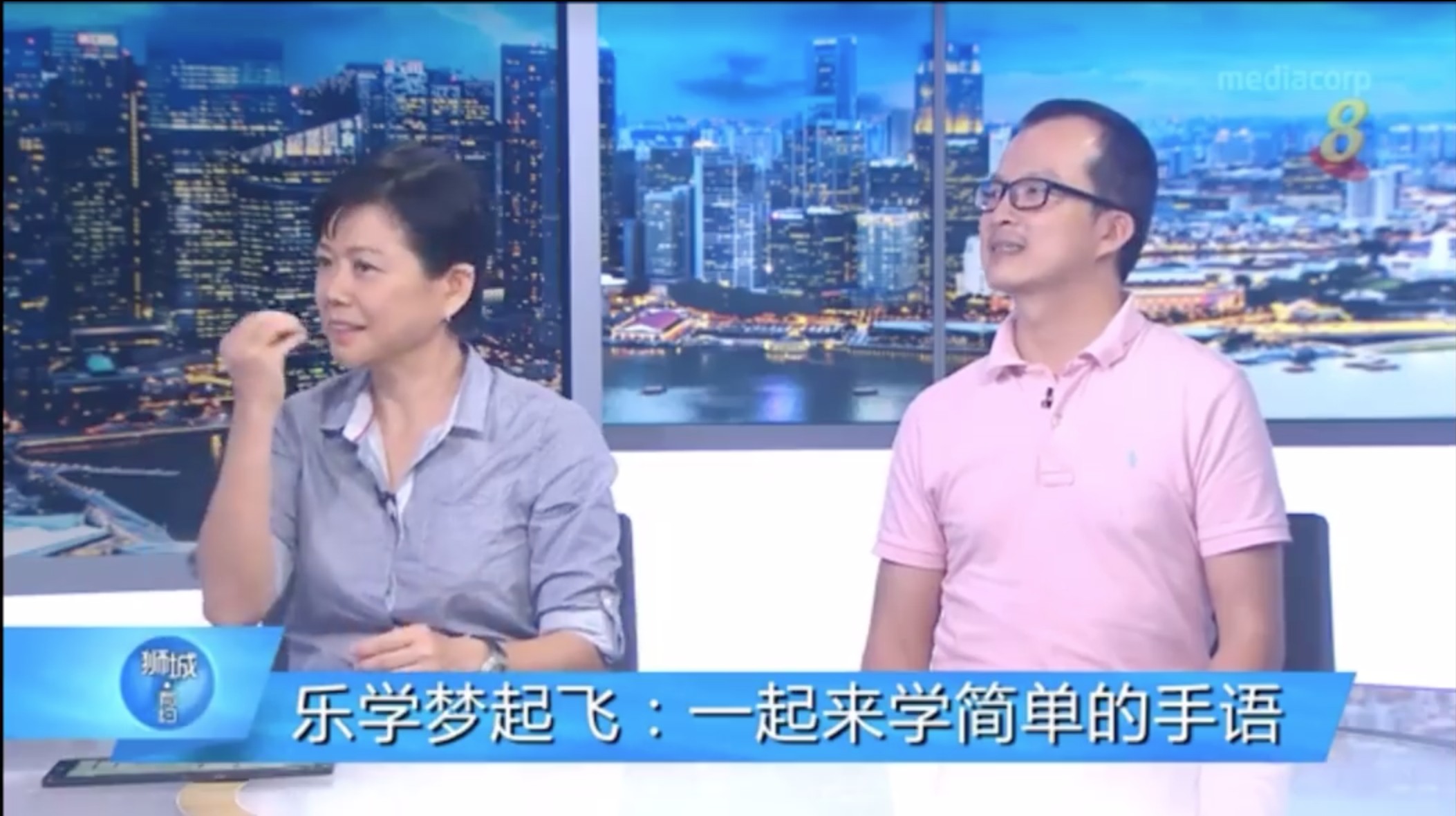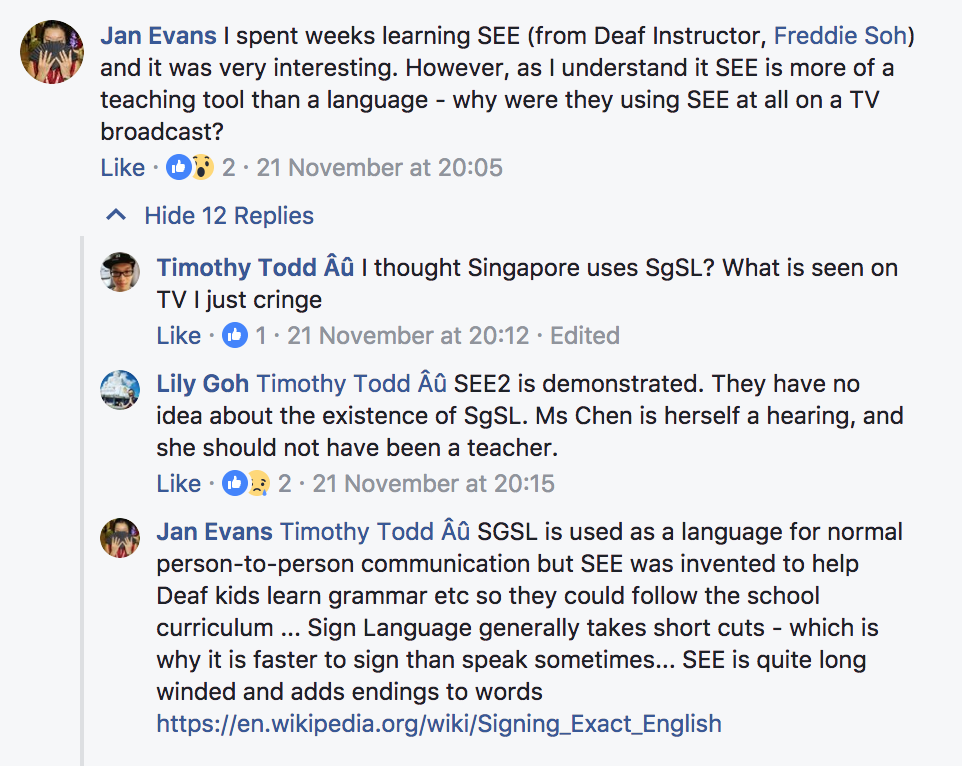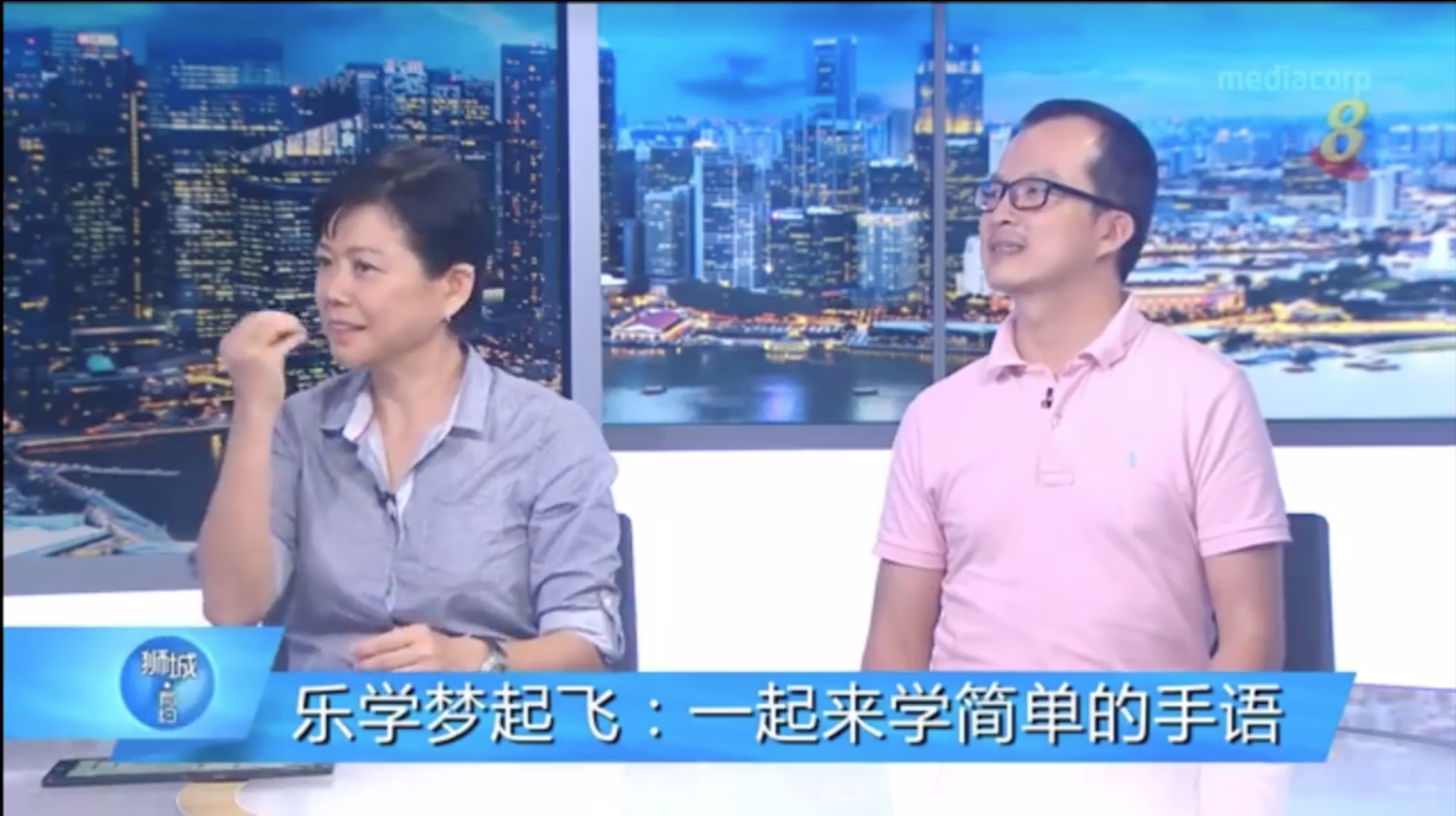It's not every day you get to see sign language featured on broadcast television in Singapore.
So, it would be a good thing if it was, as it spreads awareness of the needs of the deaf and hard-of-hearing community.
However, this one particular current affairs programme on Channel 8 gave the community a lot to be upset about.
Instructor was not an instructor
Channel 8 currently runs a current-affairs and news programme, 狮城有约 Hello Singapore. This is combined with the usual 6.30pm news and was introduced recently as a repackaged news programme.
On Nov. 20, the show interviewed a woman, Tan Teck Sum. She claims to teach SEE (Signing Exact English) to the public as part of the People's Association (PA) courses under the SkillsFuture initiative.
She is an instructor endorsed by PA to conduct sign language courses at its community centres but she is not recognised to be part of the deaf community.
She taught the show's hosts to sign the welcome message to the viewers, and how to sign the phrases "Have you eaten?" and "I have".


Incorrect signs
Those from the deaf community reacted to the show, saying that not only were the signs taught incorrectly, the instructor didn't seem to be a qualified instructor with the adequate skills to educate the public about the appropriate sign language skills.
Different sign systems
Some also debated the usage of SEE (Signing Exact English) as the sign system that ought to be taught to the hosts of the show.
It appears that the deaf community did not see it as the right system as compared to the use of SgSL (Singapore Sign Language):

Official Response
SADeaf has since put up an official statement by its executive director, Sylvia Teng, in response to the programme.
In the statement, Teng confirmed that the lady "instructor", Tan Teck Sum, has never been on SADeaf's list of SEE instructors nor on the current list of SgSL instructors.
They also took the opportunity to correct the usage of the word "deaf-mute" to describe members of the community, stating that this particular description is outdated and offensive, and is out of line with local and international guidelines.
Media Statement by Executive Director, Ms Sylvia Teng
Reference to the programme on Channel 8 Chinese Current Affairs Programmme - 狮城有约 Hello Singapore (乐学梦起飞) aired on 20 November 2017.
1) We would like to applaud MediaCorp's effort in creating awareness of our Deaf and Hard-of-hearing community through its programme and the enthusiasm shown by the interviewee (陈大均) to pick up sign language.
2) However, we have noted that during the interview segment, the show presenters and the interviewee (陈大均) repeatedly used the term "聋哑", which translates to deaf-mute to describe a deaf person who may not be able to communicate verbally. We wish to highlight that a Deaf person may not use his voice, but this does not mean he is a “mute”. This has been conveyed to the media previously and reiterated several times, but it is often forgotten.
Using the term deaf-mute to refer to people without speech is considered outdated and offensive, and should be avoided. The preferred and accurate terms are ‘’deaf’’ "聋人"or ‘’hard-of-hearing’’ "失聪人士", in line with local and internationally accepted guidelines. Deaf people have functioning vocal cords and, in fact, some have very good speech. A deaf person is not dumb. Deaf people are the same as other people except they cannot hear as well.
More information on proper terminology and sign language can be found at:
http://sadeaf.org.sg/wp-content/uploads/About-Deaf.pdf
http://sadeaf.org.sg/about-deafness/about-sign-language/
3) From our records, Ms Tan Teck Sum (Hearing) has never been on SADeaf's list of Signing Exact English (SEE) instructors nor on the current list of Singapore Sign Language (SgSL) instructors.
A qualified and trained Deaf sign language instructor would have been more appropriate to teach sign language to members of the public as he/she will be in the better position to share about our unique Deaf Culture and our language. As such, SADeaf is concerned with Ms Tan Teck Sum's teaching ability and the original source/quality of her teaching materials.
We hope our feedback will be taken seriously and please consider the feelings of our Deaf and Hard-of-hearing community by editing the term "聋哑" (which translates to deaf-mute) to describe a deaf person to "聋人" or '失聪人士" on your online platform.
We sincerely hope that the media will refrain from using the term "聋哑" (deaf-mute) when referring to a Deaf or hard-of-hearing person when doing similar interviews/stories in future.
Thank you.
Open letter to PA
The statement was then followed up by an open letter posted on Facebook on Nov. 27.
Addressed to the People's Association, Teng once again wrote on the concerns of the deaf and hard-of-hearing community regarding Tan's inaccurate signing, and also mentioned the significance of SgSL in Singapore.
According to Teng, SgSL is recognised and accepted by the deaf community for its reflection of Singapore's diverse linguistic culture, as compared to SEE, which signs English as we read and/ or hear it.
Once again, the letter emphasises that the instructor in question, is not on either list of qualified instructors, and hopes PA can take the matter seriously.
Open Letter to the People's Association (PA) by SADeaf Executive Director, Ms Sylvia Teng
Reference: Quality of Sign Language Instructors
1) We understand that The People's Association has been offering sign language courses as part of its PA Courses -SkillsFuture@PA programme which, no doubt, will encourage more members of the public to have a better understanding and communicate with our Deaf & Hard-of-hearing community.
2) However, it has been brought to our attention by concerned viewers and members of our Deaf & Hard-of-hearing community over the quality of sign language instructors after watching the inaccurate signs demonstrated by Ms Tan Teck Sum (a Hearing & an instructor endorsed/approved by PA to conduct sign language courses at its community centres) during the interview segment on Channel 8 Chinese Current Affairs Programme - 狮城有约 Hello Singapore (乐学梦起飞) aired on 20 November 2017.
It is important to note that if the person who is conducting the sign language courses does not possess the relevant qualifications/training or skills to run such courses, it will affect the course participants’ learning of the language and their proficiency in communication with our Deaf and Hard-of-hearing community.
3) Singapore Sign Language (SgSL) is our native sign language that has developed over the last 6 decades, which is socially recognised and accepted by our Deaf & Hard-of-hearing community and is a reflection of Singapore’s diverse linguistic culture.
4) Signing Exact English (SEE) is not a sign language, but a sign system which, as its name implies, follows English exactly in terms of word order and grammar. It visually represents spoken language on the hands and can be used simultaneously with voiced English.
5) Over the years, SADeaf has been dedicating resources to research and develop the Singapore Sign Language (SgSL) curriculum and teaching materials. All our SgSL instructors have to undergo regular assessments & in-house training, including training conducted by overseas trainers before they are certified to conduct SgSL courses.
6) From our records, Ms Tan Teck Sum (Hearing) has never been on SADeaf's list of Signing Exact English (SEE) instructors nor on the current list of Singapore Sign Language (SgSL) instructors.
Sign language instructors listed with PA are also not on our current list of SgSL instructors.
As such, SADeaf is concerned of their teaching abilities and the original source/quality of their teaching materials and regrettably unable to conscientiously recommend or endorse them.
A qualified and trained Deaf sign language instructor would have been more appropriate to teach sign language to members of the public as he/she will be in the better position to share about our unique Deaf Culture and our language.
We sincerely hope that PA will take our feedback seriously and look into the matter.
Thank you.
Other associations were quick to support this move, such as the Disabled People's Association Singapore.
They believe that the programme would have been more effective in their messaging if there was a representative who was deaf or hard-of-hearing, and qualified to teach the signs.
Top image adapted via Lily Goh's video recording of the 狮城有约 Hello Singapore broadcast
Here are some unrelated but equally interesting stories:
I tried giving people free stuff for three days and this is what I learned
I used to hate the smell of durian. Till I met you
Mums share their experience in helping their kids go cashless
If you like what you read, follow us on Facebook, Instagram, Twitter and Telegram to get the latest updates.
